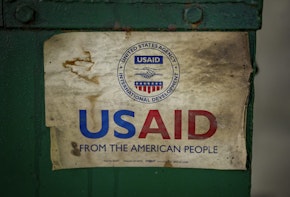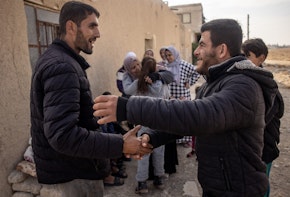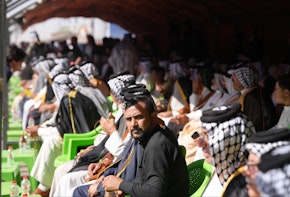Shia politics roared to the center of power in Iraq following the U.S. invasion in 2003, after decades of marginalization under Saddam Hussein. A new generation of clerics and politicians, self-described as Shia Islamists, promised a revolution in law and governance.
The meaning of Shia Islamism today is murkier than ever. A confusing array of factions all wear the label, which does nothing to explain their positions on questions ranging from sectarianism to the role of faith in politics to any of Iraq’s manifold pressing crises of governance.
Shia Power Comes of Age: The Transformation of Islamist Politics in Iraq, 2003–2023 maps the radical transformation of Shia Islamist politics in Iraq over the last two decades. Researchers deeply steeped in Iraq’s Shia communities, clerics, and politicians analyze the significance of the new status quo politics for Islamists and sectarian movements farther afield.
Iraq’s unique trajectory in the region since 2003 has made it both a test lab and a model of new approaches to religion, politics, and power. Sect and religion alone cannot explain politics and the pursuit of power. Additional factors include the importance of personalities in shaping politics; the historic networks and ties that underpin Shia parties; the ongoing importance of clerical authority; and, most clearly, the subservience of sect and ideology to the pursuit of power, by any means necessary.
Contributors include Taif AlKhudary, Ali Al-Mawlawi, Marsin Alshamary, Haley Bobseine, Thanassis Cambanis, Maria Fantappie, Fanar Haddad, Sajad Jiyad, Renad Mansour, and Ben Robin-D’Cruz.
Editor Thanassis Cambanis is a senior fellow at The Century Foundation and director of Century International. Editor Sajad Jiyad is a fellow at Century International and director of Iraq Bridge in Baghdad.
Shia Power is available online and from booksellers, and is part of “Faith and Fracture,” a Century International project supported by the Henry Luce Foundation, Carnegie Corporation of New York, and Open Society Foundations.
Arabic readers can find shorter versions of the book chapters on the Century International website.
Download Shia Power Comes of Age: The Transformation of Islamist Politics in Iraq, 2003–2023
About the Editors
Thanassis Cambanis is an author and journalist, and the director of Century International. His work focuses on U.S. foreign policy, Arab politics, and social movements in the Middle East. He is currently working on a book about the impact of the 2003 invasion of Iraq. He is the author of Once upon a Revolution: An Egyptian Story (Simon and Schuster: 2015); A Privilege to Die: Inside Hezbollah’s Legions (Free Press: 2010); and editor of five volumes about politics, conflict, and citizenship in the Middle East. He regularly contributes to Foreign Affairs, The New York Times, World Policy Review, and other publications. He is an adjunct professor at Columbia University’s School of International and Public Affairs.
Sajad Jiyad is a fellow at Century International and director of the Shia Politics Working Group. An Iraqi political analyst based in Baghdad, he is the managing director of Bridge, an Iraqi nongovernmental organization and consultancy focused on development projects for young people. Sajad’s main focus is on public policy and governance in Iraq. He is frequently published and cited as an expert commentator on Iraqi affairs. Sajad’s educational background is in economics, politics, and Islamic studies.
About the Authors
Fanar Haddad is assistant professor at the Department of Cross-Cultural and Regional Studies, University of Copenhagen. He previously served as senior advisor on international affairs to the prime minister of Iraq. His most recent book is Understanding “Sectarianism”: Sunni-Shi’a Relations in the Modern Arab World (Oxford: Hurst/Oxford University Press, 2020).
Marsin Alshamary is assistant professor of political science at Boston College. She is currently working on a book that examines the role of Shia clerics in anti-government protests in Iraq from 1920 to 2020.
Ali Al-Mawlawi is an analyst and consultant with a specialist interest in Iraqi politics, political economy and governance.
Renad Mansour is an academy fellow at the Middle East and North Africa Programme at Chatham House, where his research focuses on Iraq, Iran, and Kurdish affairs. He is also a fellow at the Cambridge Security Initiative based at the University of Cambridge, where he previously held positions as lecturer and supervisor at the faculty of politics. Renad has also held research posts at the Carnegie Middle East Center and the Iraq Institute for Strategic Studies. He received his PhD from Pembroke College, Cambridge.
Ben Robin-D’Cruz is a postdoctoral fellow in Aarhus University’s Political Science Department, where he works on the Bringing in the Other Islamists project. His academic research focuses on the Sadrist Movement, Shia Islamist politics, and Iraq’s protest movements.
Taif Alkhudary is a research officer at the London School of Economics Middle East Centre. She previously worked for various nongovernmental organizations, where she conducted research on women’s and girls’ rights and strategic litigation on violations of civil and political rights in the Gulf and Iraq.
Maria Luisa Fantappie holds a Phd from King’s College London, Department of War Studies. She has served as senior adviser at the Centre for Humanitarian Dialogue and International Crisis Group conducting fieldwork across Iraq and the Middle East for more than a decade. In 2018, she was seconded by the Italian Ministry of Foreign Affairs as a strategic adviser for security sector reform to the European Union Mission in Baghdad. She is currently an associate fellow at the Istituto Affari Internazionali.





